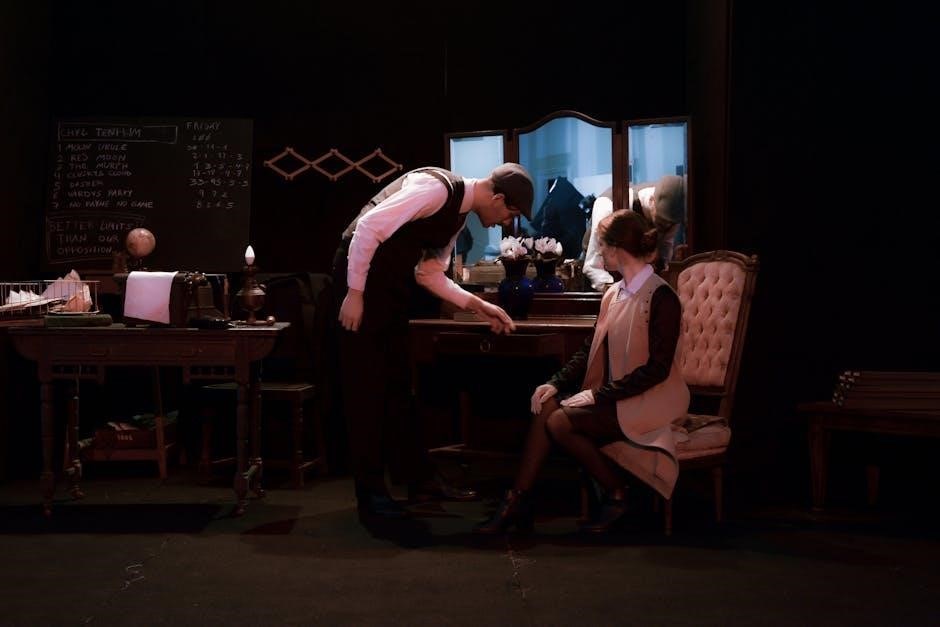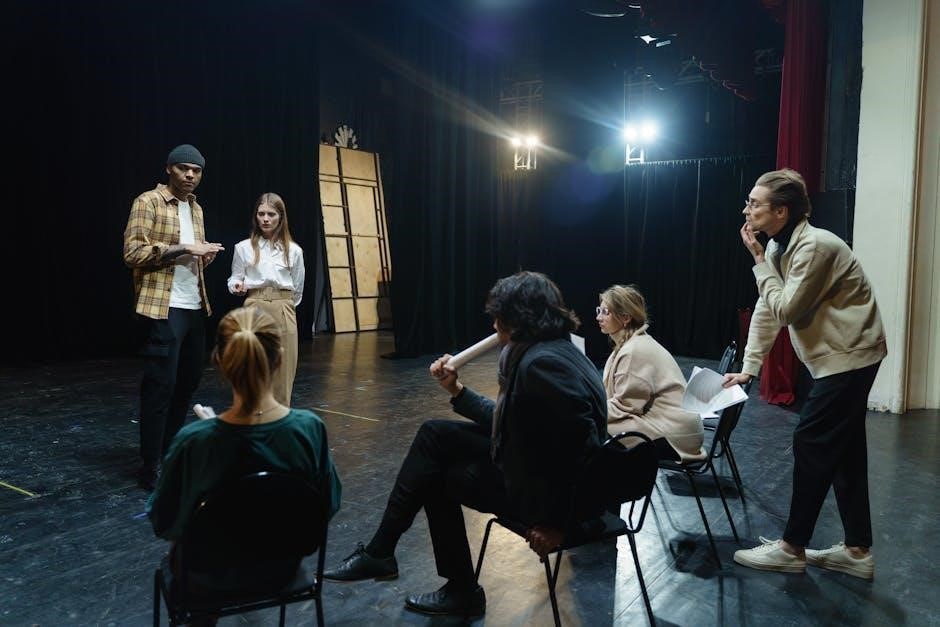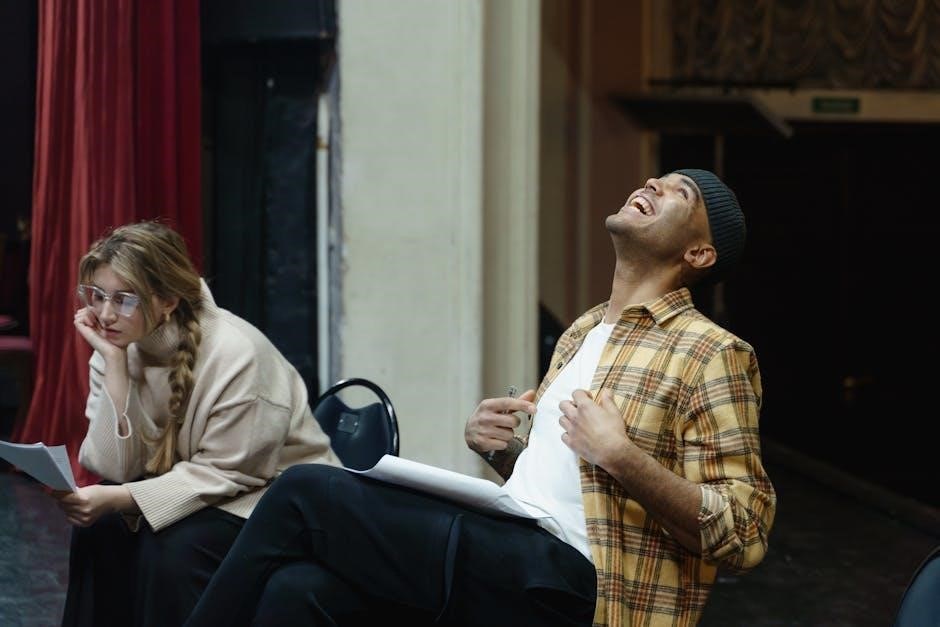The play Clue is a comedy-mystery based on the board game and movie, set in a 1954 New England mansion. It features characters like Wadsworth and Miss Scarlet, with the script adapted for stage productions. Copyright and performance rights are detailed online for those interested in staging the play.
1.1. Background and Origins of the Play
The play Clue is based on the popular board game and the cult classic film. It was adapted by Jonathan Lynn from the screenplay and board game, blending mystery and comedy. Set in a deserted New England mansion in 1954, the story unfolds during a stormy night, featuring characters like Miss Scarlet and Colonel Mustard. The play’s origins trace back to the board game’s detective theme, with the stage adaptation capturing its suspenseful and humorous elements for live audiences.
1.2. The Concept of the Play Based on the Board Game
Adapted from the iconic board game, the play Clue retains its core detective elements. Six suspects—Miss Scarlet, Colonel Mustard, Mrs. White, Mr. Green, Professor Plum, and Mrs. Peacock—gather in a mansion to unravel the mystery of Mr. Boddy’s murder. The stage version incorporates weapons, rooms, and plot twists, staying true to the game’s whodunit nature. Its interactive essence is preserved through dramatic reveals, allowing the audience to engage in solving the mystery alongside the characters, maintaining the game’s suspenseful and entertaining spirit.
1.3. The Adaptation of the Movie into a Stage Play
The stage adaptation of Clue captures the essence of the 1985 cult classic film, blending humor, mystery, and intrigue. Characters like Wadsworth and Miss Scarlet transition seamlessly from screen to stage, maintaining their iconic roles. The play enhances the film’s dynamic by incorporating theatrical elements, such as dramatic lighting and stage design, to recreate the mansion setting. Faithful to Jonathan Lynn’s screenplay, the stage version delivers a fresh yet familiar experience, appealing to both fans of the movie and newcomers alike.

Plot Structure and Key Elements
The play unfolds in a 1954 New England mansion during a stormy night, where guests assemble for dinner. Mr. Boddy’s murder sparks a thrilling investigation, revealing secrets and surprising twists as suspects unravel clues to uncover the truth. Wadsworth, the butler, guides the inquiry, keeping the audience engaged with witty dialogue and suspenseful discoveries.
2.1. The Setting: A Deserted Mansion in New England, 1954
The play is set in a deserted mansion in New England during the year 1954. The mansion provides an isolated and eerie backdrop for the story, with its grand but empty rooms creating an atmosphere of suspense. The setting plays a crucial role in shaping the characters’ interactions and the unfolding mystery. The time period adds a classic touch, reminiscent of the original board game and movie, enhancing the overall ambiance of the play.
2.2. The Mystery Unfolds: Death of Mr. Boddy
The play’s central mystery begins with the sudden death of Mr. Boddy, the mansion’s enigmatic host, during a stormy night in 1954 New England. His unexpected demise sets off a chain of events as the guests and staff become prime suspects. The script intricately reveals the characters’ reactions, from shock to suspicion, as they uncover motives and alibis. This pivotal moment shapes the plot, driving the characters to unravel the truth behind Mr. Boddy’s death.
2.3. The Investigation: Suspects and Clues
The investigation unfolds as the guests and staff uncover motives and alibis, with each suspect harboring secrets. Miss Scarlet, Colonel Mustard, and others emerge as key suspects, while clues like weapons and hidden letters point to the killer. Wadsworth, the butler, orchestrates the inquiry, guiding the group through a labyrinth of evidence. The script masterfully weaves together red herrings and revelations, keeping the audience engaged in solving the mystery alongside the characters.

Main Characters in the Play
The play features iconic characters like Wadsworth, Miss Scarlet, Colonel Mustard, Mrs. White, Mr. Green, and Yvette. Each character brings unique traits and suspects to the mystery, driving the plot forward with their secrets and motives.
3.1. Wadsworth: The Traditional British Butler
Wadsworth is the quintessential British butler, known for his strict adherence to protocol and formal demeanor. His role extends beyond serving as he becomes the driving force behind unraveling the mystery. His uptight and by-the-book nature often leads to comedic moments, while his sharp wit and keen observational skills make him instrumental in uncovering the truth. Wadsworth’s character serves as both a traditional figure of authority and an unexpected detective, adding depth to the play’s narrative.
3.2. Miss Scarlet: The Seductive and Cunning Suspect
Miss Scarlet is a central suspect in the play, known for her seductive charm and cunning nature. As a mysterious and alluring figure, she navigates the plot with calculated precision, often using her wit to manipulate others. Her interactions with Wadsworth and other characters reveal her sharp intellect and hidden motives, making her a compelling and unpredictable figure in the unfolding mystery. Her presence adds layers of tension and intrigue to the story, keeping audiences engaged and guessing.
3.3. Colonel Mustard: The Military Man with Secrets
Colonel Mustard is a military man shrouded in mystery, with a rigid demeanor that hides his true nature. His past experiences and secrets make him a prime suspect in the investigation. Through his dialogue and interactions, the play reveals his complexities, showcasing a character who is both authoritative and vulnerable. His role in the mystery adds depth to the plot, as his potential motives for Mr. Boddy’s death are uncovered, keeping the audience intrigued and suspecting his involvement.
3.4. Mrs. White: The Gossipy Housekeeper
Mrs. White is the mansion’s housekeeper, known for her sharp tongue and knack for spreading rumors. Her gossipy nature adds comedic relief while masking her own secrets. Through her interactions with other characters, Mrs. White’s loyalty and motives are questioned, making her a intriguing suspect in the murder investigation. Her role in the play highlights the tension between her duty and her personal agenda, contributing to the mystery’s complexity and keeping the audience engaged with her every revelation.
3.5. Mr. Green: The Nervous and Suspicious Guest
Mr. Green is a timid and anxious guest whose nervous demeanor immediately draws suspicion. His constant fidgeting and hesitant speech suggest he may be hiding something. Throughout the play, his interactions with other characters reveal potential motives, making him an enigmatic figure. His character’s development adds layers to the mystery, as his guilt or innocence remains uncertain, keeping the audience guessing about his true role in the events unfolding at the mansion.
3.6. Yvette: The French Maid with a Flair for Drama
Yvette, the French maid, brings a dramatic and flirtatious energy to the mansion. Her flair for exaggeration and tendency to overreact heightens the comedic tension. As a key character, she interacts with guests and staff, often revealing subtle clues. Her dramatic outbursts and playful demeanor make her a memorable figure, adding both humor and intrigue to the unfolding mystery. Yvette’s presence is essential in maintaining the play’s balance of comedy and suspense.

Themes and Genres
The play masterfully blends comedy and mystery, exploring themes of deception, betrayal, and the influence of greed and power.
4.1. Comedy and Mystery: A Perfect Blend
Clue seamlessly combines humor and suspense, creating a unique theatrical experience. The script balances witty dialogue with intriguing plot twists, keeping audiences entertained and engaged. Characters like Wadsworth and Miss Scarlet deliver comedic moments while unraveling the mystery of Mr. Boddy’s death. This blend ensures the play appeals to both comedy and mystery enthusiasts, making it a standout production in its genre.
4.2. The Exploration of Deception and Betrayal
Clue masterfully explores themes of deception and betrayal through its intricate plot and character dynamics. Each suspect harbors secrets, and their lies drive the mystery forward. The script reveals how betrayal fuels the tension, as alliances shift and truths unravel. Characters like Miss Scarlet and Colonel Mustard manipulate others to hide their own guilt, showcasing how deception is both a tool and a consequence. This thematic depth adds layers to the comedy, keeping audiences captivated by the unfolding lies and revelations.
4.3. The Role of Greed and Power in the Storyline
Greed and power are central to the plot of Clue, driving the characters’ motives and conflicts. Mr. Boddy’s manipulation of his guests, leveraging secrets and blackmail, highlights the corrupting influence of power. Miss Scarlet and Colonel Mustard’s quests for wealth and control further illustrate how greed fuels betrayal. The script reveals how these elements intertwine, leading to murder and deception. This thematic focus adds depth to the comedy, making the play a compelling exploration of human ambition and its consequences.

The Script and Its Significance
The script of Clue is adapted from the movie and board game, carefully structured to retain the mystery and humor. All rights are reserved, emphasizing its cultural and theatrical value.
5.1. The Structure of the Play Script
The script of Clue is meticulously structured to balance mystery and comedy. It follows a clear three-act format, beginning with character introductions, escalating through the investigation, and concluding with the revelation of the murderer. The dialogue is snappy and layered, ensuring suspense and humor. Stage directions are detailed to enhance the visual storytelling, making it adaptable for stage productions while preserving the essence of the original board game and film;
5.2. Key Dialogues and Their Importance
The script of Clue features witty and revealing dialogues that drive the mystery and humor. Iconic exchanges, such as Wadsworth’s clever deductions and Miss Scarlet’s cunning remarks, highlight character motives and relationships. These dialogues are essential for advancing the plot, uncovering clues, and maintaining suspense. They also showcase the comedic timing and interpersonal dynamics, making the play engaging and entertaining for audiences while staying true to the board game’s intrigue and the film’s legacy.
5.3. The Climax and Resolution of the Mystery
The climax of Clue unfolds as the suspects gather to unravel Mr. Boddy’s murder. Wadsworth meticulously pieces together the clues, revealing the killer’s identity and their motives. The resolution ties together the intricate web of secrets, exposing the truth behind the murder. The final twist leaves the audience in suspense until the very end, delivering a satisfying conclusion to the mystery. This dramatic payoff highlights the play’s masterful blend of comedy and detective work, ensuring an unforgettable theatrical experience.

Production and Staging
The play’s production involves intricate stage design, replicating a 1954 New England mansion. Props include period-specific items, while costume design reflects each character’s personality. Sound effects and strategic lighting enhance the mysterious atmosphere, immersing the audience in the whodunit experience.
6;1. Stage Design and Props
The stage design for Clue replicates a deserted New England mansion in 1954, featuring multiple rooms like the study, library, and ballroom. Props include period-specific furniture, weapons (revolver, rope, wrench), and clues like letters and keys. The set must be versatile to transition between rooms seamlessly. Lighting and sound effects, such as flickering lights and creaking doors, enhance the mysterious atmosphere. Authenticity in props and design is crucial to immerse the audience in the whodunit mystery.

6.2. Costume Design and Character Representation
Costume design in Clue reflects the 1950s New England setting, with characters dressed in period-specific attire. Wadsworth, the butler, wears a formal suit, while Miss Scarlet dons a glamorous red dress. Colonel Mustard sports a military-inspired uniform, and Mrs. White wears a traditional housekeeper’s outfit. Yvette, the French maid, has a distinctive uniform with a flirtatious flair. Costumes are vibrant, with bold colors and patterns, ensuring each character’s personality shines through. Accessories like hats, gloves, and jewelry add authenticity to the roles.
6.3. Sound Effects and Lighting in the Play
Sound effects and lighting play a crucial role in setting the mood of Clue. Thunderstorms and creaking doors create suspense, while dramatic music highlights key plot twists. Lighting is used to focus attention on specific clues or characters, such as spotlights during revelations. Dimming lights and sudden sounds amplify tension, while subtle background noises, like ticking clocks, build anticipation. These elements work together to immerse the audience in the mysterious 1954 mansion setting, enhancing the comedic and mysterious tone of the play.

Copyright and Performance Rights
The play Clue is protected by copyright, with all rights reserved. Licensing requests must be directed to Broadway Licensing, Inc., adhering to specified royalty fees and restrictions.
7.1. Licensing Requirements for Staging the Play
Licensing for Clue is managed exclusively by Broadway Licensing, Inc. All requests must be submitted through their platform, ensuring compliance with royalty fees and legal terms. The script cannot be altered without explicit permission, preserving the original storyline and dialogue. Adherence to these requirements ensures legal performance rights, maintaining the integrity of the play based on the board game and movie adaptation.
7.2. Royalty Fees and Performance Rights
Royalty fees for performing Clue are specified on the Playscripts website. These fees vary based on the production type and audience size. Performance rights must be obtained through Broadway Licensing, Inc., ensuring compliance with all legal terms. Adherence to these requirements guarantees the rights to stage the play, preserving its original intent and script integrity. Failure to meet these obligations may result in legal consequences, emphasizing the importance of proper licensing and fee payment.
7.3. Restrictions on Script Alterations
Any alterations to the Clue play script require permission. Changes to dialogue, character gender, or music are prohibited without authorization. Cutting scenes or modifying objectionable language is restricted unless explicitly approved. These restrictions ensure the play’s integrity and original intent are maintained. Licensing agreements must be followed to avoid legal issues, emphasizing the importance of adhering to the script as provided. Unauthorized changes can lead to performance rights being revoked, ensuring compliance is crucial for productions.

Educational and Cultural Value
The play Clue serves as a dynamic tool for drama education, fostering creativity and teamwork. Its cultural significance lies in its adaptation of a classic board game, making it relatable and engaging for diverse audiences. The play also supports amateur theater by providing a fun, interactive storyline that encourages participation and innovation in productions.
8.1. The Play as a Tool for Drama Education
The play Clue is an excellent educational resource, fostering creativity, teamwork, and problem-solving skills. Its interactive nature engages students, encouraging them to explore character development and plot twists. The script provides a structured yet adaptable framework, allowing young actors to practice dialogue delivery, timing, and stage presence. Additionally, the play’s mystery element promotes critical thinking and collaboration, making it a valuable tool for drama education and amateur theater productions.
8.2. Cultural Significance of the Play
The play Clue holds cultural significance as it bridges generations, adapting a beloved board game and film into a theatrical experience. Its blend of comedy and mystery resonates with diverse audiences, making it a staple in amateur and professional theater. The play’s iconic characters and witty dialogue have cemented its place in pop culture, ensuring its relevance and appeal. Its adaptability to stage productions further highlights its enduring legacy as a timeless entertainment piece.
8.3. The Play’s Impact on Amateur Theater
The play Clue has become a favorite in amateur theater due to its accessible script and manageable production requirements. Its blend of comedy and mystery appeals to diverse audiences, making it a popular choice for community and school performances. The play’s clear structure and iconic characters allow amateur actors to shine, fostering creativity and teamwork. Its availability for licensing through platforms like Broadway Licensing, Inc., further supports its widespread adoption in amateur productions, ensuring its continued success in this sector.

Audience Reception and Reviews
Audiences and critics praise the play Clue for its hilarious blend of mystery and comedy, keeping viewers engaged until the final twist. Its faithful adaptation from the board game and film ensures widespread appeal and enthusiastic reception.
9.1. Audience Feedback and Reactions
Audiences have praised the play Clue for its engaging mix of mystery and comedy, with many appreciating its faithful adaptation from the board game and film. The interactive nature of the story, where viewers attempt to solve the mystery alongside the characters, adds to its appeal. Fans of both the game and movie have expressed satisfaction with the stage adaptation, while newcomers enjoy its unique blend of humor and suspense. The play’s ability to maintain intrigue until the final twist has made it a favorite across diverse audiences.
9.2. Critical Reviews of the Play
Critics have praised the play Clue for its clever adaptation of the board game and film, blending mystery with comedy seamlessly. Reviewers highlight the engaging storyline and the cast’s ability to bring iconic characters like Miss Scarlet and Wadsworth to life. The play’s pacing and plot twists have been commended for keeping audiences entertained and guessing. While some note its lighthearted nature, many agree it successfully captures the essence of the original source material, making it a delightful experience for fans and newcomers alike.
9.3. The Play’s Success in Different Regions
The play Clue has enjoyed widespread success across various regions, particularly in the U.S., where its comedic mystery resonates well. Its popularity extends to the UK, Canada, and Australia, where the board game and movie are deeply ingrained in pop culture. Amateur theater groups worldwide have embraced the play, making it a staple in community productions. Its universal appeal lies in its blend of humor and intrigue, ensuring its success across diverse audiences and regions.
Clue remains a timeless blend of mystery and comedy, captivating audiences with its clever plot twists and memorable characters, ensuring its enduring appeal in theater and pop culture.
10.1. The Lasting Appeal of the Play
Clue’s enduring popularity stems from its masterful blend of comedy and mystery, keeping audiences engaged with its intricate plot twists and relatable characters. The play’s adaptability to various stages and demographics ensures its relevance across generations. Its roots in a beloved board game and cult film further cement its place in popular culture, making it a favorite for both amateur and professional theater productions. This timeless appeal guarantees its continued success in years to come.
10.2. The Play’s Contribution to Theater and Pop Culture
Clue has significantly influenced theater and pop culture by blending a board game, film, and stage production into one cohesive narrative. Its unique adaptation has inspired new approaches to theatrical storytelling, while its iconic characters, like Wadsworth and Miss Scarlet, have become cultural references. The play’s comedy-mystery format has set a benchmark for whodunits, making it a staple in amateur and professional theater. Its enduring success highlights its ability to connect with diverse audiences, solidifying its legacy in both theater and popular culture.
10.3. Future Prospects for the Play
Clue continues to be a popular choice for theaters due to its adaptable script and timeless themes. Its success in amateur productions and regional theaters highlights its enduring appeal. With licensing managed by Broadway Licensing, Inc., the play remains accessible for future performances. New interpretations and creative staging ideas will keep the play fresh, ensuring its relevance in the evolving world of theater. Its blend of mystery and comedy guarantees continued engagement with audiences worldwide.

